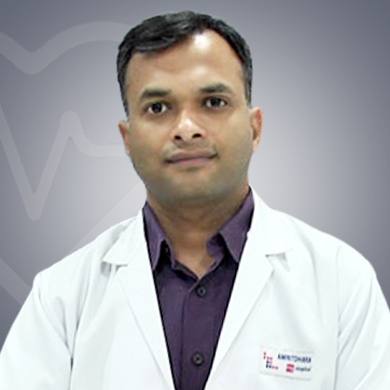
Karnal, India
9 Years of experience
Speaks: English
Dr. Nitin Kumar Bansal is a specialized Bariatric Surgeon in India. And one of the most sought after medical specialists in Karnal, India. The doctor has over 9 Years of experience and is associated with .
Association and Memberships Dr. Nitin Kumar Bansal is part of:
Certifications :
Qualifications :
What is the medical expertise of Dr Nitin Kumar Bansal?
Please make sure to see your doctor using Telemedicine before you even board a flight
Following are some of the best General Surgeons in other cities:
General surgeons are doctors who specialize in surgical procedures to treat conditions related to various body parts. A general surgeon is part of a surgical team that includes nurses, an anesthesiologist, and surgical technicians. A general surgeon has specialized knowledge of different surgical processes, from the initial evaluation through preparation and post-operative management.
A general surgeon understands all the below-given basic areas of surgery:
Today, most general surgeons are familiar with minimally invasive procedures like laparoscopy. Laparoscopic surgeries make use of much smaller tools, including small cameras that allow the surgeon to see what is going on inside the body. These specialized instruments will help the surgeon make much smaller cuts than they could with conventional procedures.
General surgeons have a broad knowledge of different diseases and conditions. They will tell you whether you require surgery and what kind of surgery would be best for you. As general surgeon treats a variety of conditions, they need to meet unique needs.
Anyone interested in becoming a general surgeon needs to go through a long period of medical education for acquiring board certification and licensure. After completing 10+2 with PCB, a candidate can continue your further studies towards becoming a general surgeon.
These doctors have special training in the field of general surgery. They have to earn an MBBS degree before focusing on their specialty area.
After obtaining an MBBS degree, the next step is to pursue the PG course, MS, which is one of the most popular PG courses after MBBS. This degree makes you eligible for practicing as a general surgeon. A surgeon's residency program includes at least 48 weeks of full-time work with patients.
Some of the specialization areas for a prospective general surgeon are:
General surgeons provide medical as well as surgical care. They focus on injuries and conditions affecting the breasts, abdomen, digestive system, skin, and endocrine system. They also evaluate imaging tests, lab tests, and biopsies as part of delivering care. Surgeons treat people of all ages, with a wide range of conditions.
Here are some common conditions they treat:
Many general surgeons recommend routine laboratory tests before admission to the hospital, or before some outpatient procedures, to identify exact problems that may complicate surgery if not detected and treated early. A general surgeon may tell you to get the below tests done to identify your condition and design a treatment plan accordingly.
Your doctor/general physician may refer you to a general surgeon depending on the diagnostic reports and the complexity of your condition. General physicians and other doctors work very closely with general surgeons in case the treatment plan requires an invasive approach. It may be because the medications are not working and there’s a disease that needs to be removed surgically by a general surgeon.
Below are some symptoms which suggest that you need to consult a general surgeon to discuss your problem and get treatment options.
When you visit with a general surgeon, they will thoroughly evaluate your health in order to make sure that surgery is the right option for you. The surgeon will also explain the procedure and answer your queries about the procedure.
Your first visit with a surgeon typically is a consultation designed to assess your medical history and tests, review how the problem may be affecting you, and completely examine you to collect the necessary information that will help in deciding the next steps together. Sometimes, we might need more information like additional tests and discussions with your PCP to ensure that all of the medical issues have been addressed.
Your general surgeon will tell you how to get ready for the operation, including:
The surgeon will tell you what to expect during your recovery. If your surgery needs a hospital stay, they will tell you how long you could expect to stay in the hospital and what you will require once you are discharged.
Some common procedures performed by a general surgeon include: